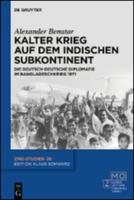Kalter Krieg auf dem indischen Subkontinent
Die deutsch-deutsche Diplomatie im Bangladeschkrieg 1971
| dc.contributor.author | Benatar, Alexander | |
| dc.date.accessioned | 2020-08-06T14:30:48Z | |
| dc.date.available | 2020-08-06T14:30:48Z | |
| dc.date.issued | 2020 | |
| dc.identifier | ONIX_20200806_9783110682038_9 | |
| dc.identifier | OCN: 1158150983 | |
| dc.identifier.uri | https://library.oapen.org/handle/20.500.12657/41225 | |
| dc.language | German | |
| dc.relation.ispartofseries | ZMO-Studien | |
| dc.subject.classification | thema EDItEUR::N History and Archaeology::NH History | en_US |
| dc.subject.classification | thema EDItEUR::N History and Archaeology::NH History::NHB General and world history | en_US |
| dc.subject.classification | thema EDItEUR::N History and Archaeology::NH History::NHG Middle Eastern history | en_US |
| dc.subject.classification | thema EDItEUR::N History and Archaeology::NH History::NHW Military history | en_US |
| dc.subject.other | Cold War | |
| dc.subject.other | Bangladesh Liberation War | |
| dc.subject.other | Détente | |
| dc.subject.other | Diplomatic History | |
| dc.title | Kalter Krieg auf dem indischen Subkontinent | |
| dc.title.alternative | Die deutsch-deutsche Diplomatie im Bangladeschkrieg 1971 | |
| dc.type | book | |
| oapen.abstract.otherlanguage | 1971 was a critical year for India and Pakistan and also for West and East Germany. The Third India–Pakistan War led to the independence of Bangladesh, at the same time that the German–German policy of détente sought to surmount the East–West conflict. The global Cold War influenced both regional conflicts and linked them to each other. However, at their points of intersection, they were also bounded by the influence of the great powers. | |
| oapen.identifier.doi | 10.1515/9783110682038 | |
| oapen.relation.isPublishedBy | 2b386f62-fc18-4108-bcf1-ade3ed4cf2f3 | |
| oapen.relation.isFundedBy | 17747ee1-3834-4877-b07b-f81e2433d3be | |
| oapen.imprint | De Gruyter | |
| oapen.series.number | 38 | |
| oapen.pages | 257 | |
| oapen.place.publication | Berlin/Boston | |
| oapen.grant.number | [grantnumber unknown] |

